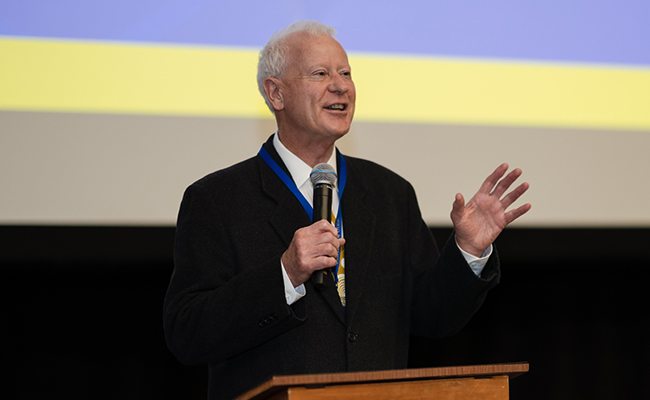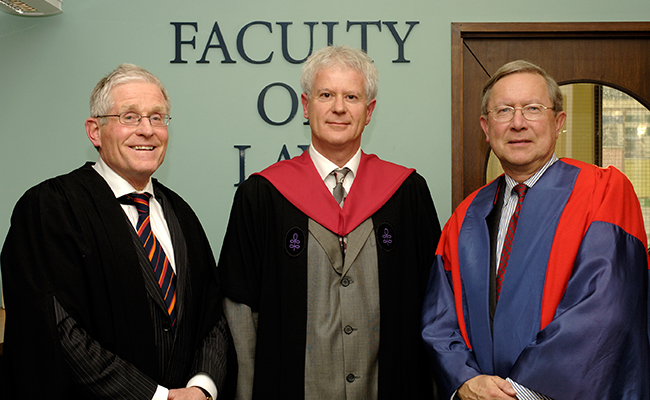
Emeritus Professor John Dawson speaking at the recent celebrations for 150 years of Law at Otago.
“It's a great privilege to pass your life among enthusiastic, intelligent young people,” says Emeritus Professor John Dawson.
He has been awarded the title of Emeritus Professor on his retirement in April from Te Kaupeka Tātai Ture Faculty of Law. This honour acknowledges his distinguished career, which has been as much ethical as academic.
A student of Otago
An Otago graduate himself, Emeritus Professor Dawson recalls a much smaller University of about 5,000 students when he started in 1973. He completed what would today be called a “PPE degree” in Politics, Philosophy and Economics, with a BA Honours in Politics. He then completed a Law Honours degree.
The late Professor Jim Flynn was the Professor of Politics at that time. “He was a moral, rather than political, philosopher. He was a big influence on many people, including me. His whole approach to life was strongly ethical; including opposition to racism in all its forms,” says Emeritus Professor Dawson.
Many enduring friendships were formed in the tightknit and active student body: “Muldoon was Prime Minister, and many were opposed to his policies, there were very active regular debates. I was also very involved in capping activities, including four years in the sextet – half the town would come to the capping concert in the Regent Theatre.”
Socio-legal research in mental health
The Emeritus Professor's family have roots in Ōtepoti and in medicine. His father and paternal grandfather were surgeons, and his maternal grandmother was an early graduate of Edinburgh Medical School.
His own research has been mainly in mental health law. “I had this family medical background plus an interest in human rights, and my father suffered from depression, so I had mental health issues at the forefront of my life. It was a combination of these things really.”
Emeritus Professor Dawson's research has mainly been on the civil side of mental health law, including law governing compulsory psychiatric treatment under the Mental Health Act, and the privacy of psychiatric records. As well as orthodox study of law in the books, he has conducted fieldwork on the operation of the law within mental health services. This socio-legal work was innovative, cross-disciplinary and not common in New Zealand.
“It tells you what's going on in the world and how the law is operationalised and practised, but whether the law requires reform is still a distinct question; that's more of a value question to grapple with.”
A particular focus of his research has been how the law has adapted to the massive deinstitutionalisation of psychiatric hospitals that occured from the 1970s into the 1990s in New Zealand.
"When people were moved out of hospital to community treatment, would compulsion follow them? Would they be placed under community treatment orders, where they would be required to continue taking psychiatric medication outside hospital? If so, how could that work – 'enforcing medication' in the community – in a manner consistent with developing conceptions of patients' human rights?"

Professor John Dawson, centre, with Professors Mark Henaghan and Peter Skegg before his inaugural professorial lecture in 2007.
After graduating from Otago, Emeritus Professor Dawson completed a Master of Laws (LLM) at Harvard. Returning to New Zealand, he worked at the Mental Health Foundation in Auckland, researching the operation of the Mental Health Act in Auckland hospitals and advocating law reform. He returned to the Faculty of Law at Otago in 1990, after 10 years away.
When he joined the Faculty, Professor Peter Skegg was pioneering law and medicine in New Zealand. A postgraduate Master of Bioethics and Health Law degree was established between the Centre for Bioethics and the Law Faculty: "This has been a very successful degree".
International connections and collaborations have been one of the pleasures of his career. He has enjoyed sabbaticals; his sons were twice in schools overseas for a year. He has taught as a visitor at McGill in Montreal and at the University of Toronto, and has worked with research teams based in Oxford and at the Institute of Psychiatry, in London. As a result of these interdisciplinary collaborations, he has published extensively in psychiatry and mental health journals, as well as law journals. In 2011, he was awarded a Doctor of Laws (LLD) degree by the University for publications in this field.
Commitment to Te Tiriti and the Pacific
Emeritus Professor Dawson has also made a significant contribution to the Faculty and wider legal profession's understanding of and commitment to Te Tiriti o Waitangi in his secondary field of research in public law, with a focus on relations between the New Zealand state and Māori, and on Treaty settlements.
“In studying the committal processes in Auckland in the early 1980s the overrepresentation of Māori and Pacific people in the mental health system was glaringly obvious, as it is now. I was a Pākeha from the South and without much exposure to Māori matters prior to this, so I saw the need to educate myself.”
At this time, New Zealand was undergoing significant political and legal change, with the establishment of State Owned Enterprises and the extension of the Waitangi Tribunal's jurisdiction to cover events occurring before 1975, which generated a lot of Treaty-related litigation.
“Anyone seriously interested in New Zealand public or constitutional law, as I was, took an interest in this; this was the cutting edge of New Zealand public law.”
Emeritus Professor Dawson taught a course that focussed on Treaty settlements and the law governing this, taking over from course founder Grant Liddell.
A career highlight has been supervising Māori students. “The top students have been consistently outstanding. Having the opportunity to supervise Māori students who have gone on to have important legal careers has been very rewarding.”
This led to an interest in Pacific law more generally, including visits to the University of the South Pacific Law School in Vanuatu, coaching Pacific students in mooting, and helping establish a regular academic conference on Pacific law with law schools of the South Pacific.
“All of these matters have been very rewarding. There was a need for this work to be done and I found it fascinating. The process of decolonisation of the legal system that is happening in New Zealand is also happening in the Pacific, in different ways. Of course, preferably Pacific legal scholars will emerge who will take over much of this work.”

John Dawson and Otago law students presenting a lawnmower and teaching materials to a school in Vanuatu.
Next
Emeritus Professor Dawson says the Law Faculty has been a congenial place to work, and tolerant of a wide range of perspectives. At one point his academic colleagues had more than 400 years of service to the Faculty between them. This was an inspiring work environment. He also appreciates the professional staff he has worked alongside at Otago, including the law librarians.
Emeritus Professor Dawson was the key organiser of the Faculty's recent celebrations of 150 years of Law at Otago, which were attended by nearly 400 people and included the launch of the Dean's Innovation Fund that he hopes will continue to grow over time.
He is still supervising a PhD student, and serving on a committee advising the Law Commission about the review of New Zealand's mental capacity laws.
He mainly plans to retire – golf, gardening, travel, fishing, reading, and grandchildren.
